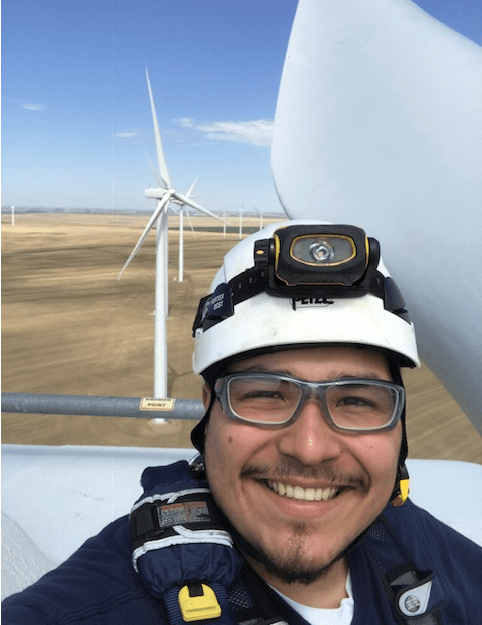
Purdue Northwest grad part of industry renewal
Purdue Northwest grad is part of an industry’s renewal
January 23, 2020
High atop a wind turbine in the plains of Alberta, Canada, Purdue University Northwest (PNW) alumnus Andrew Perez carefully studies the movements of his co-workers, who are maintaining the giant propeller-like generator sitting some 300 feet above the ground on a massive steel rod.
Perez is at one of 11 wind farms in North America owned and operated by ACCIONA Energy, where he, as an environmental health and safety specialist, is conducting a quality and safety audit. His report could inform the creation of a new worker safety program or be used to revise training protocols for rescuing workers at those heights.
Workplace safety has been Perez’s passion ever since his first class in organizational leadership at Purdue Northwest. Never in his wildest dreams did the Hammond, Indiana native ever imagine his degree would launch him to the forefront of the renewable energy sector, let alone work for one of its global leaders.
“Safety is all around us; and with my family working in construction, hospitals, and manufacturing, I thought it would be great for me to learn more of what I can do to help,” said Perez.
Perez graduated from Purdue Northwest in 2016 with a Bachelor of Science in Organizational Leadership and Supervision (OLS), and a concentration in Environmental Health and Safety (EHS). While at PNW, he applied classroom knowledge in three paid internships, which quickly elevated his career prospects.
“The best part of my job is knowing that I am making a difference by keeping workers safe so they can go home to their families.”
“You have to show a drive—show that you can do more,” said Perez. “That’s why I applied myself to all these internships. If I hadn’t done any of that, I wouldn’t be where I am today.”
He was PNW’s first safety intern at NIPSCO, and later interned at the regional office of the Occupational Safety and Health Administration (OSHA). Both experiences quickly earned Perez his first post-graduation job as a safety specialist at an automotive parts stamping plant, before landing his dream job less than a year later with the fourth largest renewable energy company in the world.
“Originally the position was for someone with five to ten years of experience. They took a chance on me largely based on my drive, my attitude and good reviews from my professors and those I interned with,” said Perez.
While renewable energy is a growing field, so too is occupational health and safety, according to Shoji Nakayama, associate professor of Construction Science and Organizational Leadership in Purdue Northwest’s College of Technology.
Nakayama cites a 2011 assessment by the National Institute for Occupational Safety and Health (NIOSH) indicating a future shortage of trained professionals. The Bureau of Labor Statistics (BLS) also projects employment of occupational health and safety professionals to grow eight percent from 2016 to 2026.
Nakayama says PNW’s Occupational Leadership and Supervision program prepares students for good-paying careers in industrial safety, environmental health, construction safety, transportation safety, risk management, loss control and industrial hygiene. According to the BLS, the median annual salary of occupational health and safety specialists in 2017 was $71,780.
“Students gain theoretical and practical sets of skills about safety, and also an understanding of how safety helps businesses stay globally competitive,” said Nakayama. “We also emphasize creativity, critical thinking, effective communication and character as a safety professional.”
Graduates, like Perez, with the environmental health and safety concentration gain employment advantages because PNW’s program is a Qualified Academic Program (QAP) by the Board of Certified Safety Professionals, a highly respected designation within the profession.
“With the QAP designation, our graduates can apply for the Graduate Safety Practitioner (GSP) credential, which makes them immediately eligible to take the Certified Safety Professional (CSP) exam, the ‘gold standard’ of safety certifications,” said Nakayama.
Back on the ground in his downtown Chicago office, Perez excitedly recognizes the fast-track his career is on after recently attending an industry conference.
“There’s not a lot of young people in this field,” he said. “I’m part of the future here. I’ll be part of molding and shaping this industry for years to come.”
More information about PNW’s Organizational Leadership and Supervision (OLS) – Area of Specialization in Environmental Health and Safety (EHS) program can be found at pnw.edu/ehs.